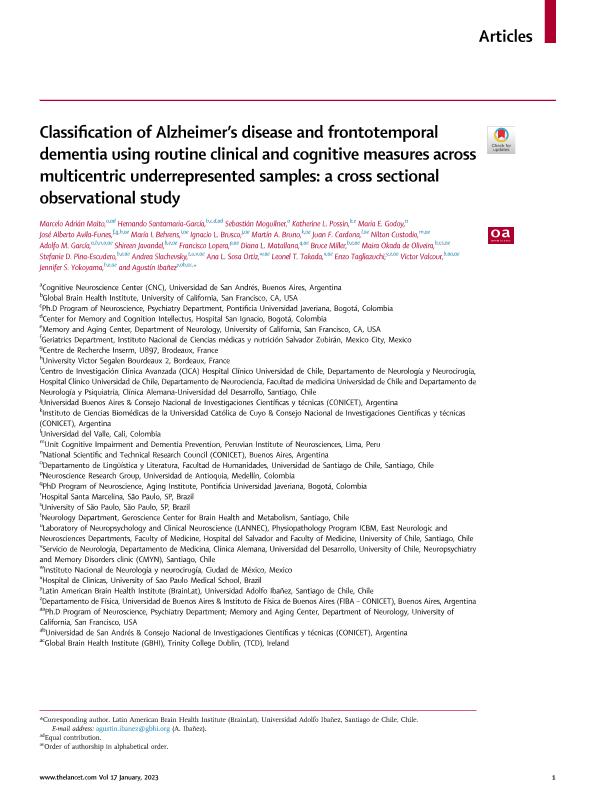Artículo
Classification of Alzheimer's disease and frontotemporal dementia using routine clinical and cognitive measures across multicentric underrepresented samples: A cross sectional observational study
Maito, Marcelo Adrián; Santamaria Garcia, Hernando ; Moguilner, Sebastián; Possin, Katherine L.; Godoy, María Eugenia; Avila Funes, José Alberto; Behrens, María I.; Brusco, Luis Ignacio
; Moguilner, Sebastián; Possin, Katherine L.; Godoy, María Eugenia; Avila Funes, José Alberto; Behrens, María I.; Brusco, Luis Ignacio ; Bruno, Martin
; Bruno, Martin ; Cardona, Juan F.; Custodio, Nilton; García, Adolfo Martín
; Cardona, Juan F.; Custodio, Nilton; García, Adolfo Martín ; Javandel, Shireen; Lopera, Francisco; Matallana, Diana L.; Miller, Bruce; Okada de Oliveira, Maira; Pina-Escudero, Stefanie D.; Slachevsky, Andrea; Sosa Ortiz, Ana L.; Takada, Leonel T.; Tagliazuchi, Enzo; Valcour, Victor; Yokoyama, Jennifer S.; Ibañez, Agustín
; Javandel, Shireen; Lopera, Francisco; Matallana, Diana L.; Miller, Bruce; Okada de Oliveira, Maira; Pina-Escudero, Stefanie D.; Slachevsky, Andrea; Sosa Ortiz, Ana L.; Takada, Leonel T.; Tagliazuchi, Enzo; Valcour, Victor; Yokoyama, Jennifer S.; Ibañez, Agustín
 ; Moguilner, Sebastián; Possin, Katherine L.; Godoy, María Eugenia; Avila Funes, José Alberto; Behrens, María I.; Brusco, Luis Ignacio
; Moguilner, Sebastián; Possin, Katherine L.; Godoy, María Eugenia; Avila Funes, José Alberto; Behrens, María I.; Brusco, Luis Ignacio ; Bruno, Martin
; Bruno, Martin ; Cardona, Juan F.; Custodio, Nilton; García, Adolfo Martín
; Cardona, Juan F.; Custodio, Nilton; García, Adolfo Martín ; Javandel, Shireen; Lopera, Francisco; Matallana, Diana L.; Miller, Bruce; Okada de Oliveira, Maira; Pina-Escudero, Stefanie D.; Slachevsky, Andrea; Sosa Ortiz, Ana L.; Takada, Leonel T.; Tagliazuchi, Enzo; Valcour, Victor; Yokoyama, Jennifer S.; Ibañez, Agustín
; Javandel, Shireen; Lopera, Francisco; Matallana, Diana L.; Miller, Bruce; Okada de Oliveira, Maira; Pina-Escudero, Stefanie D.; Slachevsky, Andrea; Sosa Ortiz, Ana L.; Takada, Leonel T.; Tagliazuchi, Enzo; Valcour, Victor; Yokoyama, Jennifer S.; Ibañez, Agustín
Fecha de publicación:
01/2023
Editorial:
Elsevier
Revista:
Lancet Regional Health - Americas
ISSN:
2667-193X
Idioma:
Inglés
Tipo de recurso:
Artículo publicado
Clasificación temática:
Resumen
Background: Global brain health initiatives call for improving methods for the diagnosis of Alzheimer's disease (AD) and frontotemporal dementia (FTD) in underrepresented populations. However, diagnostic procedures in upper-middle-income countries (UMICs) and lower-middle income countries (LMICs), such as Latin American countries (LAC), face multiple challenges. These include the heterogeneity in diagnostic methods, lack of clinical harmonisation, and limited access to biomarkers. Methods: This cross-sectional observational study aimed to identify the best combination of predictors to discriminate between AD and FTD using demographic, clinical and cognitive data among 1794 participants [904 diagnosed with AD, 282 diagnosed with FTD, and 606 healthy controls (HCs)] collected in 11 clinical centres across five LAC (ReDLat cohort). Findings: A fully automated computational approach included classical statistical methods, support vector machine procedures, and machine learning techniques (random forest and sequential feature selection procedures). Results demonstrated an accurate classification of patients with AD and FTD and HCs. A machine learning model produced the best values to differentiate AD from FTD patients with an accuracy = 0.91. The top features included social cognition, neuropsychiatric symptoms, executive functioning performance, and cognitive screening; with secondary contributions from age, educational attainment, and sex. Interpretation: Results demonstrate that data-driven techniques applied in archival clinical datasets could enhance diagnostic procedures in regions with limited resources. These results also suggest specific fine-grained cognitive and behavioural measures may aid in the diagnosis of AD and FTD in LAC. Moreover, our results highlight an opportunity for harmonisation of clinical tools for dementia diagnosis in the region. Funding: This work was supported by the Multi-Partner Consortium to Expand Dementia Research in Latin America (ReDLat), funded by NIA/ NIH ( R01AG057234), Alzheimer's Association ( SG-20-725707-ReDLat), Rainwater Foundation, Takeda ( CW2680521), Global Brain Health Institute; as well as CONICET; FONCYT-PICT ( 2017-1818, 2017-1820); PIIECC, Facultad de Humanidades, Usach; Sistema General de Regalías de Colombia ( BPIN2018000100059), Universidad del Valle ( CI 5316); ANID/ FONDECYT Regular ( 1210195, 1210176, 1210176); ANID/ FONDAP ( 15150012); ANID/ PIA/ ANILLOS ACT210096; and Alzheimer's Association GBHI ALZ UK-22-865742.
Archivos asociados
Licencia
Identificadores
Colecciones
Articulos(CCT - SAN JUAN)
Articulos de CENTRO CIENTIFICO TECNOLOGICO CONICET - SAN JUAN
Articulos de CENTRO CIENTIFICO TECNOLOGICO CONICET - SAN JUAN
Citación
Maito, Marcelo Adrián; Santamaria Garcia, Hernando; Moguilner, Sebastián; Possin, Katherine L.; Godoy, María Eugenia; et al.; Classification of Alzheimer's disease and frontotemporal dementia using routine clinical and cognitive measures across multicentric underrepresented samples: A cross sectional observational study; Elsevier; Lancet Regional Health - Americas; 17; 100387; 1-2023; 1-14
Compartir
Altmétricas



